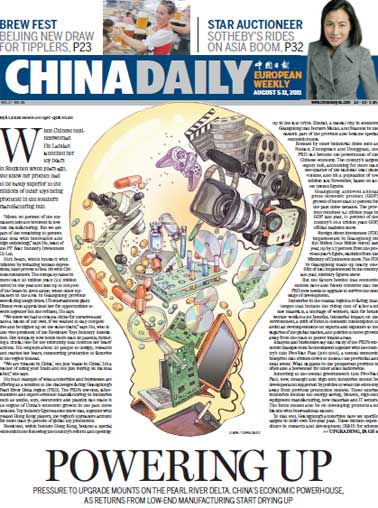Economy
Emerging markets slide 'near end'
Updated: 2011-08-11 07:47
By Michael Patterson (China Daily)
LONDON - The lowest developing-nation equity valuations since January 2009 are a sign that the MSCI Emerging Markets Index's worst tumble in three years is nearing an end, according to strategists at three of the world's biggest banks.
Concern that global economic growth is faltering has sent the measure down 15 percent this month through Tuesday, to 8.9 times estimated profits, 30 percent below the 20-year average, data compiled by Bloomberg and Morgan Stanley show.
The valuations imply that emerging-market earnings will drop about 20 percent in the next 12 months, according to the New York-based bank.
The retreat might have been overdone because rising consumer demand in developing nations will boost profits by 3 percent even if advanced economies slip toward recession, Europe's debt crisis worsens and China keeps a tight monetary policy, said Jonathan Garner, Morgan Stanley's chief Asia and emerging-markets strategist.
Shares may hit bottom within days, said Jason Press at Citigroup Inc. Valuations are at levels seen two years ago after the collapse of Lehman Brothers Holdings Inc and during the 1990s emerging-market crises, said Nicholas Smithie at UBS AG.
"Stocks look like buys", Smithie, the New York-based emerging-market strategist at UBS, Switzerland's biggest lender, said in an Aug 8 interview. "There has to be a Lehman-style collapse in economic activity and stress in the financial system for these valuations to be justified."
$7 trillion
Investors who purchased shares when the MSCI emerging index fell below 9 times earnings in October 2008 were rewarded with a 60 percent rally during the subsequent 12 months, according to data compiled by Bloomberg. The gauge jumped 44 percent in the year after valuations tumbled that low in August 1998, the month Russia defaulted on $40 billion of debt, the data show.
The gauge's drop in the past six days was the biggest since October 2008, a month after Lehman's bankruptcy roiled world markets and helped spark a global recession.
The unprecedented downgrade of the US' long-term credit rating by Standard & Poor's, weaker-than-estimated US economic data and signs that Italy and Spain might struggle to refinance debt have eroded investor confidence in riskier assets this month, erasing almost $7 trillion of stock-market capitalization.
Samsung Electronics Co, the world's second-largest maker of mobile phones, and OAO Gazprom, Russia's natural-gas export monopoly, led declines in emerging markets as benchmark equity indexes in Brazil, Russia, India and China fell more than 20 percent from recent highs.
MSCI's emerging-market gauge pared declines Tuesday after the US Federal Reserve Board pledged to keep its benchmark interest rate at a record low at least through mid-2013 and closed down 2.2 percent.
Record profits
There are no signs yet of a collapse in emerging-market earnings. Second-quarter profits at MSCI index companies jumped by an average 30 percent, more than five times the MSCI World Index's 5.6 percent gain, data compiled by Bloomberg show.
Twelve-month earnings for each share in the emerging index climbed to a record high of $95 last month and could increase 19 percent in the next 12 months, according to the average of more than 12,000 analyst estimates compiled by Bloomberg.
Garner said his "base case" estimate is for earnings growth of 13 percent.
Developing economies will probably expand 6.4 percent next year, compared with 2.6 percent in advanced nations, according to June estimates from the International Monetary Fund.
Stocks are "pricing in an earnings recession, which certainly does not seem to be the case", Press, a New York-based emerging-market strategist at Citigroup, said in an Aug. 8 interview. "The market panic has gone too far."
Higher rates
While analysts are projecting higher profits during the next 12 months, they have trimmed forecasts by about 3.8 percent since mid-July, according to data compiled by Bloomberg.
Estimates are likely to drop further as weaker global growth erodes companies' earnings prospects and central banks in some developing countries tighten monetary policy, said Adrian Mowat, the chief Asia and emerging-market strategist at JPMorgan Chase & Co in Hong Kong.
Brazil and India have raised interest rates five times this year to curb inflation, while China has lifted borrowing costs three times. A Chinese government report on Tuesday showed inflation in China was 6.5 percent in July, the fastest pace in three years.
"I don't think the buy point for these markets is now," Mowat said in an Aug 8 interview. "What signals the end of this tightening cycle is weaker economic data followed by lower inflation. That is probably an event that is some point in the fourth quarter."
Bloomberg News
E-paper

My Chinese Valentine
Local businesses are cashing in on a traditional love story involving a cow herder and a goddess
Outdoor success
Lifting the veil
Allure of mystery
Specials

Star journalist leaves legacy
Li Xing, China Daily's assistant editor-in-chief and veteran columnist, died of a cerebral hemorrhage on Aug 7 in Washington DC, US.

Sowing the seeds of doubt
The presence in China of multinationals such as Monsanto and Pioneer is sparking controversy

Lifting the veil
Beijing's Palace Museum, also known as the Forbidden City, is steeped in history, dreams and tears, which are perfectly reflected in design.
